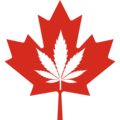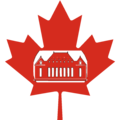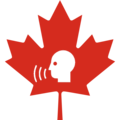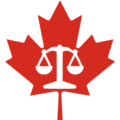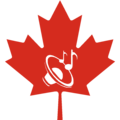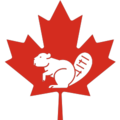Portal:Canada
| Showcase | Contents | Contributing |
Introduction
Canada is a country in North America. Its ten provinces and three territories extend from the Atlantic Ocean to the Pacific Ocean and northward into the Arctic Ocean, making it the world's second-largest country by total area, with the world's longest coastline. Its border with the United States is the world's longest international land border. The country is characterized by a wide range of both meteorologic and geological regions. With a population of just over 41 million people, it has widely varying population densities, with the majority residing in urban areas and large areas of the country being sparsely populated. Canada's capital is Ottawa and its three largest metropolitan areas are Toronto, Montreal, and Vancouver.
A developed country, Canada has a high nominal per capita income globally and its advanced economy ranks among the largest in the world by nominal GDP, relying chiefly upon its abundant natural resources and well-developed international trade networks. Recognized as a middle power, Canada's support for multilateralism and internationalism has been closely related to its foreign relations policies of peacekeeping and aid for developing countries. Canada promotes its domestically shared values through participation in multiple international organizations and forums. (Full article...)
Featured article -
Lethbridge (/ˈlɛθbrɪdʒ/ LETH-brij) is a city in the province of Alberta, Canada. With a population of 106,550 in the 2023 municipal census, Lethbridge became the fourth Alberta city to surpass 100,000 people. The nearby Canadian Rocky Mountains contribute to the city's warm summers, mild winters, and windy climate. Lethbridge lies approximately 215 km (134 mi) southeast of Calgary on the Oldman River and 105 km (65 mi) northwest of the Canada–United States border at the Sweetgrass–Coutts Border Crossing. (Full article...)
Current events
- May 1, 2025 – 2025 Southwest United States measles outbreak
- North America's three largest measles outbreaks continue to expand, with over 2,500 confirmed cases. There have been three fatalities in the United States and one in Mexico. The outbreaks began in Ontario, Canada, then surged in Texas and New Mexico, and have quickly escalated in Chihuahua, Mexico. (AP News)
- April 28, 2025 – 2025 Canadian federal election
- Voters in Canada go to the polls to elect the 343 members of the House of Commons to the 45th Canadian Parliament. (BBC)
- The Liberal Party under leader Mark Carney is projected to form government for the party's fourth consecutive mandate, with Carney remaining prime minister. (The Globe and Mail)
- Conservative Party leader Pierre Poilievre and New Democratic Party leader Jagmeet Singh lose their seats, with the NDP also losing official party status in the House. Each make speeches conceding the election, with Singh announcing his intention to resign as party leader. (CTV News)
- April 27, 2025 – 2025 Vancouver car attack
- The death toll from yesterday's vehicle-ramming attack at a street festival in Vancouver, British Columbia, Canada, rises to eleven with at least 20 others injured, making the attack tied for the deadliest vehicle-ramming attack in Canadian history. The British Columbia Prosecution Service charges the perpetrator with eight counts of second-degree murder, while investigators also rule out terrorism. (CTV News) (AP)
- April 26, 2025 – 2025 Vancouver car attack
- Nine people are killed and several others injured, after a car is driven through a crowd at a Philippine-Canadian festival in Vancouver, British Columbia, Canada. (Al Jazeera)
Selected panorama -
Woody Point, Western Newfoundland. Panorama of the Gros Morne National Park with the Tablelands, overlooking Bonne Bay
Credit: Tango7174
National symbol -

Canada Day, formerly known as Dominion Day, is the national day of Canada. A federal statutory holiday, it celebrates the anniversary of Canadian Confederation which occurred on July 1, 1867, with the passing of the British North America Act, 1867, when the three separate colonies of the United Canadas, Nova Scotia, and New Brunswick were united into a single dominion within the British Empire called Canada. (Full article...)
Selected vital article -

Religion in Canada encompasses a wide range of beliefs and customs that historically has been dominated by Christianity. The constitution of Canada refers to 'God', however Canada has no official church and the government is officially committed to religious pluralism. Freedom of religion in Canada is a constitutionally protected right, allowing individuals to assemble and worship without limitation or interference. Rates of religious adherence have steadily decreased since the 1960s. After having once been central and integral to Canadian culture and daily life, Canada has become a post-Christian state. Although the majority of Canadians consider religion to be unimportant in their daily lives, they still believe in God. The practice of religion is generally considered a private matter throughout society and the state. (Full article...)
Selected picture -
Featured biography -
Richard Gavin "Dick" Reid (17 January 1879 – 17 October 1980) was a Canadian politician who served as the sixth premier of Alberta from 1934 to 1935. He was the last member of the United Farmers of Alberta (UFA) to hold the office, and that party's defeat at the hands of the upstart Social Credit League in the 1935 election made him the shortest serving premier to that point in Alberta's history. (Full article...)
Did you know -

- ... that a journalists' poll rated Billy Fitzgerald the second-best Canadian lacrosse player of the first half of the 20th century?
- ... that Canadian football player Nicholas Dheilly tied his team's single-game sack record in his debut?
- ... that Canadian heritage minister Pascale St-Onge was the bassist in an all-lesbian alternative rock quartet?
- ... that a Sunday afternoon phone call to Ken Battle laid the foundations for the Canadian Child Benefit program?
- ... that a 23-day CBC strike thrust Don Goodwin into the Canadian national spotlight and into "folk-hero status"?
- ... that Angéline de Montbrun by Laure Conan is the first psychological novel written by a French Canadian?
- ... that in 2019, the Canadian government's Translation Bureau began providing translation services in Dene, East Cree, Plains Cree, and Mohawk?
Featured list -
The Vanier Cup (French: Coupe Vanier) is the trophy awarded annually to the champion Canadian football team in U Sports, the governing body for university sports in Canada. The U Sports football champion is determined in a one-game playoff (the Vanier Cup game), played by the winners of the Uteck Bowl and the Mitchell Bowl. In turn, the participating teams are determined by the winners of four bowl games: the Loney Bowl (AUS), Hardy Cup (Canada West), Dunsmore Cup (RSEQ), and Yates Cup (OUA). The Vanier Cup game is played at a neutral site that changes every year; the hosting university is determined months or years in advance. (Full article...)
Main articles
Associated Wikimedia
The following Wikimedia Foundation sister projects provide more on this subject:
-
Commons
Free media repository -
Wikibooks
Free textbooks and manuals -
Wikidata
Free knowledge base -
Wikinews
Free-content news -
Wikiquote
Collection of quotations -
Wikisource
Free-content library -
Wikiversity
Free learning tools -
Wikivoyage
Free travel guide -
Wiktionary
Dictionary and thesaurus







